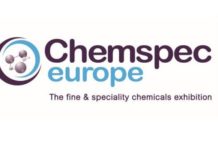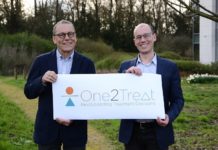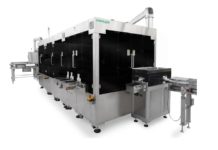- Opdivo + Yervoy Regimen now approved for unresectable or metastatic melanoma patients, regardless of BRAF mutational status
- Approval of the Regimen marks a novel combination treatment for advanced melanoma patients, demonstrating the potential of targeting distinct and complementary immune pathways.
- With this fifth EU approval for Opdivo, in three distinct tumor types, more patients fighting cancer have access to Immuno-Oncology treatment options in Europe
World pharma today/-press releases/-Bristol-Myers Squibb Company announced that the European Commission (EC) has approved Opdivo in combination with Yervoy for the treatment of advanced (unresectable or metastatic) melanoma in adults, representing the first and only approved combination of two Immuno-Oncology agents in the European Union (EU). This approval allows for the marketing of the Opdivo + Yervoy Regimen in all 28 Member States of the EU. Approval was based on CheckMate -067, the first Phase 3, double-blind, randomized study, in which the Opdivo + Yervoy Regimen and Opdivo monotherapy demonstrated superior progression-free survival (PFS) and objective response rates (ORR) in patients with advanced melanoma, regardless of BRAF mutational status, versus Yervoy alone. The safety profile was consistent with previously reported studies evaluating the Opdivo +Yervoy Regimen, and most treatment-related adverse events were managed using established algorithms.
Dr. James Larkin, from The Royal Marsden and lead author on CheckMate – 067, the trial that led to this approval, commented, “Historically, advanced melanoma has been a very difficult-to-treat disease. Now, with this approval, patients in Europe will have a treatment option combining two Immuno-Oncology therapies, Opdivo and Yervoy, which in a Phase 3 randomized trial has shown its ability to deliver superior efficacy versusYervoy monotherapy in progression-free survival and response. This is truly good news for healthcare providers and the patients they treat, as it represents an important new treatment option with the potential for improved outcomes.”
In study CheckMate -067, the Opdivo + Yervoy Regimen demonstrated a 58% reduction in the risk of disease progression versus Yervoy monotherapy in previously untreated patients with advanced melanoma (HR=0.42 [99.5% CI: 0.32-0.56; p<0.0001]), whileOpdivo monotherapy demonstrated a 45% risk reduction versus Yervoy monotherapy (HR=0.55 [99.5% CI: 0.42-0.73; p<0.0001]). The median PFS for the Opdivo + YervoyRegimen was 11.5 months (95% CI: 8.9-22.18) and 6.9 months (95% CI: 4.3-9.5) for Opdivo monotherapy versus 2.89 months (95% CI: 2.8-3.4) for Yervoymonotherapy, at a minimum follow-up of 18 months. The Opdivo + Yervoy Regimen andOpdivo monotherapy also demonstrated a higher ORR (ORR: 58% and 44%, p<0.0001, respectively) versus Yervoy monotherapy (19%). Median duration of response was not reached for the Opdivo + Yervoy Regimen and was 22.3 months for Opdivomonotherapy, versus 14.4 months for Yervoy alone.
Based on a pre-planned, descriptive analysis of data from CheckMate -067, the EC adopted the Committee for Medicinal Products for Human Use (CHMP) recommendation to add an informative statement to the broad indication that relative to Opdivomonotherapy, an increase in PFS for the combination of Opdivo with Yervoy is established only in patients with low tumor PD-L1 expression. In the study, overall response rates were higher for the combination of Opdivo and Yervoy relative to Opdivomonotherapy across tumor PD-L1 expression levels.
The approval was also based on supportive data from the Phase 2 study, CheckMate -069, in which the Opdivo + Yervoy Regimen demonstrated an ORR, the primary endpoint, of 61% (95% CI: 48.9-72.4) in patients with BRAF wild-type advanced melanoma, versus 11% (95% CI: 3-25.4) ORR in the Yervoy monotherapy arm, with a minimum follow-up of 11 months. The estimated 12- and 18-month overall survival (OS) rates were 79% (95% CI: 67, 87) and 73% (95% CI: 61, 82), respectively, for theOpdivo + Yervoy Regimen, and 62% (95% CI: 44, 75) and 56% (95% CI: 39, 70), respectively, for Yervoy monotherapy. The OS data are based on an exploratory, pre-planned analysis of patients with BRAF wild-type advanced melanoma.
Emmanuel Blin, senior vice president, Head of Commercialization, Policy and Operations, Bristol-Myers Squibb, commented, “Today’s approval of the Opdivo + Yervoy Regimen for advanced melanoma patients supports our goal of developing innovative treatment approaches that have the potential to improve patient outcomes. The Opdivo + YervoyRegimen is the first and only approved Immuno-Oncology combination, and only Regimen to deliver superior efficacy compared to Yervoy, and we are thrilled to make this novel combination treatment available to patients with advanced melanoma in Europe.”
About Advanced Melanoma
Melanoma is a form of skin cancer characterized by the uncontrolled growth of pigment-producing cells (melanocytes) located in the skin. Metastatic melanoma is the deadliest form of the disease, and occurs when cancer spreads beyond the surface of the skin to the other organs, such as the lymph nodes, lungs, brain or other areas of the body. Melanoma is the ninth most common cancer in Europe, with an estimated 100,000 new cases diagnosed annually and more than 20,000 deaths.
Bristol-Myers Squibb & Immuno-Oncology: Advancing Oncology Research
At Bristol-Myers Squibb, we have a vision for the future of cancer care that is focused on Immuno-Oncology, now considered a major treatment modality alongside surgery, radiation and chemotherapy for certain types of cancer.
We have a comprehensive clinical portfolio of investigational and approved Immuno-Oncology agents, many of which were discovered and developed by our scientists. We pioneered the research leading to the first regulatory approval for the combination of two Immuno-Oncology agents, and continue to study the role of combinations in cancer.
Our collaboration with academia, as well as small and large biotech companies is responsible for researching the potential of Immuno-Oncology and non-Immuno-Oncology combinations, with the goal of providing new treatment options in clinical practice.
At Bristol-Myers Squibb, we are committed to changing expectations in hard-to-treat cancers and the way patients live with cancer.
About Opdivo
Cancer cells may exploit “regulatory” pathways, such as checkpoint pathways, to hide from the immune system and shield the tumor from immune attack. Opdivo is a PD-1 immune checkpoint inhibitor that binds to the checkpoint receptor PD-1 expressed on activated T-cells, and blocks the binding of PD-L1 and PD-L2, preventing the PD-1 pathway’s suppressive signaling on the immune system, including the interference with an anti-tumor immune response.
Opdivo’s broad global development program is based on Bristol-Myers Squibb’s understanding of the biology behind Immuno-Oncology. Our company is at the forefront of researching the potential of Immuno-Oncology to extend survival in hard-to-treat cancers. This scientific expertise serves as the basis for the Opdivo development program, which includes a broad range of Phase 3 clinical trials evaluating overall survival as the primary endpoint across a variety of tumor types. The Opdivo trials have also contributed toward the clinical and scientific understanding of the role of biomarkers and how patients may benefit from Opdivo across the continuum of PD-L1 expression. To date, the Opdivo clinical development program has enrolled more than 18,000 patients.
Opdivo was the first PD-1 immune checkpoint inhibitor to receive regulatory approval anywhere in the world in July 2014, and currently has regulatory approval in 50 countries including the United States, Japan, and in the European Union.
About the Bristol-Myers Squibb and Ono Pharmaceutical Co., Ltd. Collaboration
In 2011, through a collaboration agreement with Ono Pharmaceutical Co., Ltd (Ono) Bristol-Myers Squibb expanded its territorial rights to develop and commercialize Opdivo globally except in Japan, South Korea and Taiwan, where Ono had retained all rights to the compound at the time. On July 23, 2014, Bristol-Myers Squibb and Ono further expanded the companies’ strategic collaboration agreement to jointly develop and commercialize multiple immunotherapies – as single agents and combination regimens – for patients with cancer in Japan, South Korea and Taiwan.
About Bristol-Myers Squibb
Bristol-Myers Squibb is a global biopharmaceutical company whose mission is to discover, develop and deliver innovative medicines that help patients prevail over serious diseases. For more information about Bristol-Myers Squibb
Contact:
Bristol-Myers Squibb Media:
Audrey Abernathy, 609-419-5375cell: 919-605-4521
audrey.abernathy@bms.com
or
Investors:
Ranya Dajani, 609-252-5330ranya.dajani@bms.com
or
Bill Szablewski, 609-252-5894william.szablewski@bms.com


























